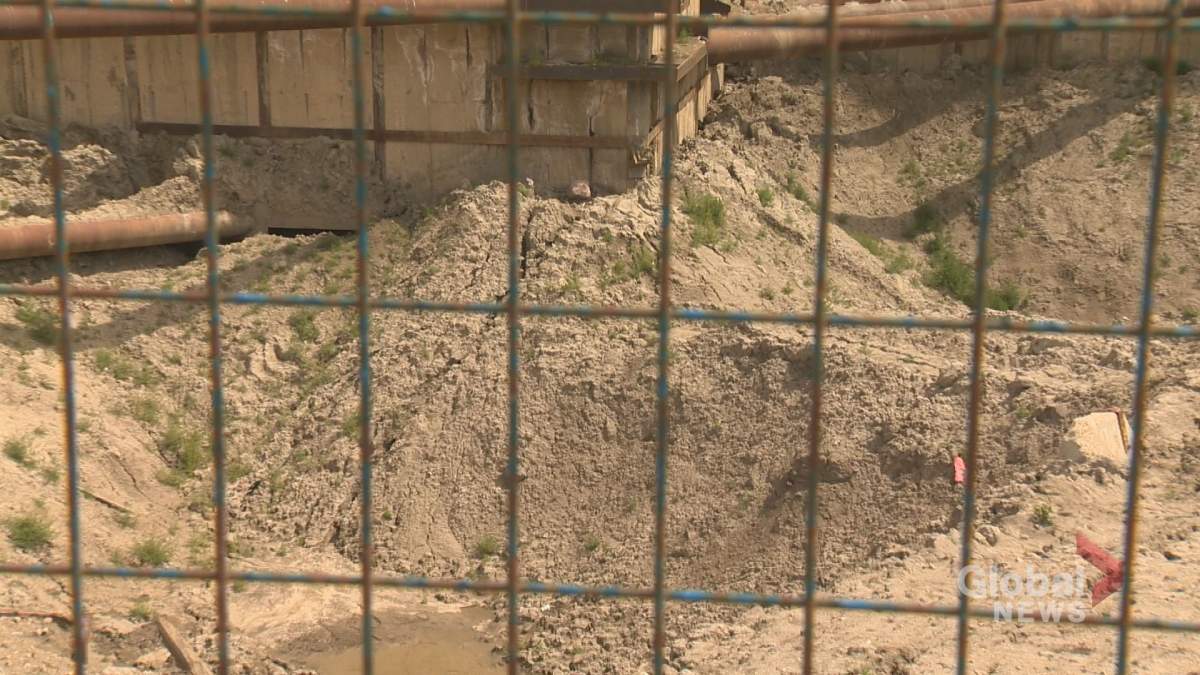For over five hours, the legal counsel for the City of Regina and WestGate Properties Ltd., the firm responsible for the Capital Pointe hole, delved into the minutiae — and the millimetres —of ground shifting.

It was the first day of the Capital Pointe appeal before the Saskatchewan Building and Accessibility Standards Appeal Board.
But as Neil Abbott of Gowling WLG, counsel for WestGate, stated, “We’re not here to talk about investors, purchasers, when the site is going to be finished, how it is going to be finished.”

Instead, they called Kai-Sing Hui, a geotechnical engineer of the firm EXP, to testify on their behalf. Hui, who is quite familiar with Regina, is one of the engineers of record for the Regina Bypass project, and now for the Capital Pointe project.
“It’s in a safe condition,” Hui began. “The necessary tests have been conducted.”
What followed were demonstrations of soil tests, diagrams, modelled stress tests, and the same question: is the development at 1971 Albert Street safe?
It was dry, often technical, but it will decide the future of the planned 27-storey hotel and condo.
“Our professional opinion is that the site is stable, and that the shoring will expire on December 8,” Hui said.
It’s an assessment that runs contradictory to that of Isherwood Geostructural Engineers, the former engineer of record who issued a letter to the city that claimed the site was unsafe, and advised it be decommissioned immediately.
Isherwood reported the site had sustained “large, unexpected lateral movements,” noting that the shoring on the northeast corner of the site and on the south wall had shifted between 36-40 mm, or less than 2 inches, between summer of 2017 and June of 2018.

Get breaking National news
Abbott argued that even if the city deems the shoring unsafe, they must look at “alternatives” rather than filling the hole. Hui suggested there should be monthly monitoring to ensure the shoring stays put.
According to Hui, surveys conducted by Altus Geomatics on June 5 and June 29 of this year showed that the shoring had not experienced any additional movement, proving that the site was stable.
Remedial action was taken in December 2017 to improve the shoring on the northeast corner. By February 2018, Isherwood informed the city they had used soil from the centre of the build to expand the berms, adding more stability to the sections that suffered the most movement.
“In any shoring design, by nature, there is always some movement,” explained Hui. Regina is particularly susceptible to this movement, Hui explained, saying that its unique clay soil — sampled during the Regina Bypass project — contracts or expands depending on moisture levels.
But the shifting the site experienced was far greater than the 20 mm threshold established by Isherwood.
He countered by arguing that “once it moves, it’s moved,” adding that EXP based their recommendations on the current site of the state, and whether or not the shoring is still moving.
Hui also added that the letter issued by Isherwood to the city, claiming the site was unsafe, might not be entirely accurate.
For a period of time during spring 2018, it’s believed Isherwood did not have access to the site to perform field visits or monitor data. Hui suggested that Isherwood may have sent the letter pre-emptively to disencumber themselves of any legal liability, should the site become unsafe.
“If Isherwood thought the site was unsafe, they wouldn’t have designed remedial works,” Hui argued. “But they did; they must have been happy with their previous work.”
Isherwood’s assessment of the safety of the site is a particular bone of contention for the city because it stands in direct contradiction to what EXP — the current engineer of record, and Hui’s employer — is saying.
EXP did not conduct a full and detailed design review of the shoring. Instead, they’re relying on a high-level review of the site, and previous statements from Isherwood which say the site is safe.
If construction is to continue on the site, or if WestGate Properties tries to apply for a new building permit — they currently don’t have one for excavation on the site — a detailed design review would be required.
Christine Clifford, legal counsel for the City of Regina, asked Hui if there were any plans to conduct a detailed review in the six months before the current shoring expires, to which Hui responded no. When asked if EXP would issue the same letter of unsafe conditions in December if no changes were made, he acknowledged they would.
Hui maintained that frequent monitoring of the site would be enough to ensure its safety, and that, as it stands, the shoring is designed well enough to endure even extreme weather event — something he said “wouldn’t happen in those six months. It’s highly, highly unlikely.”
It’s not much, but it may be a glimmer of hope for investors who poured thousands into the project — people who may lose everything if the hole is filled.
“It’s going to be difficult to determine, at least in the short term, what investors have to look forward to,” said Robert MacKay, a partner with the law firm MacKay & McLean.
Although investors may have the legal ability to sue for their money, the chances they will actually be paid out are low. Mackay says investments brokered through a realtor would likely be easier to recover.
“The reason is if they did it through a realtor their money is likely held in trust through a brokerage account some place. That money’s pretty safe. If they went through the developer directly then there’s going to be some question as to what happened with their money and where is it today,” MacKay noted.
The city will continue their cross-examination of Hui on Wednesday before presenting their own expert witness. The hearing is expected to wrap up on Thursday.








Comments